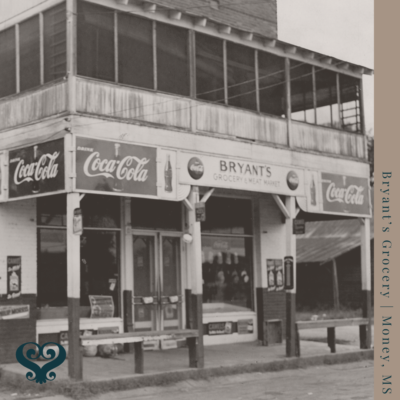On the side of an old country road in a town so small you could easily miss it, sits Money, MS. It’s a dried-up spot in the Mississippi Delta between the old Yazoo & Mississippi Valley rail line and the Tallahatchie River. Train tracks separate Money Road from a field that extends as far as the eye can see. Remnants of long ago dried up cotton plants move in the breeze. Just out ahead is an old building in crumbling disrepair, overgrown with weeds and vines, surrounded by a bright orange construction fence.
69 years ago, the dilapidated building would be a busy market with the words Bryant’s Grocery & Meat Market written across the building. The cotton field across the street would be a flourishing, lush sea of white. In August of 1955 a steady stream of customers would be resting and chatting on the porch, sipping cold bottles of soda. A group of Black teens would walk up to the grocery store after a long day of working in the fields. One of the teens, a young man, sauntered into the store and in a few short minutes, the country would never be the same.
Emmett Till was a 14-year old from Chicago, visiting relatives in Money, MS. His mother, Mamie Till warned him that whites in the South could react violently to behavior that was tolerated in the North. When Emmett entered Bryant’s Grocery, he would have seen 21 year-old Carolyn Bryant, the white woman behind the counter. It is unclear what happened in the store that day, but Bryant claimed that Emmett made lewd advances and wolf-whistled at her. Days later, Bryant’s relatives, Roy Bryant and J.W. Milam, abducted Emmett, brutally beating and lynching him before disposing of his body in the nearby Tallahatchie River.
Emmet Till’s body was so disfigured, his uncle could only identify it by his ring. In a five-day trial, his murderers were acquitted by an all-white judge and jury, in Sumner, MS. Later they would go on to publicly confess to the lynching. Mamie Till insisted her son be brought to Chicago. In a decision that would change the trajectory of American history, she demanded the world bear witness to what was done to her son. She held an open casket service where hundreds came to pay their respects. She allowed Jet Magazine to publish his photos, sending shockwaves across the nation.
Three months later, in Montgomery, Alabama, Rosa Parks refused to relinquish her seat on the bus. She is quoted as saying, “I thought about Emmett Till, and I could not go back. My legs and feet were not hurting, that is a stereotype. I paid the same fare as others, and I felt violated.” Moved by the forthrightness and determination of Mamie Till, leaders like Parks, Dr. Martin Luther King, Jr, and John Lewis, among many others, began the Civil Rights Movement of the 1960s.
In 2017, Carolyn Bryant recanted her decades old testimony, admitting that Emmett Till had never touched, threatened or harassed her. She is quoted as saying “Nothing that boy did could ever justify what happened to him.” Bryant was never charged with any crime in relation to Emmett Till’s murder. In 2022 an unserved arrest warrant was found for Carolyn Bryant. A grand jury failed to indict her citing insufficient evidence. She died at the age of 88 in 2023.

